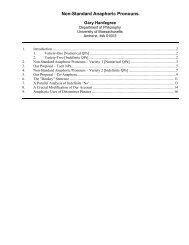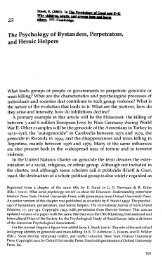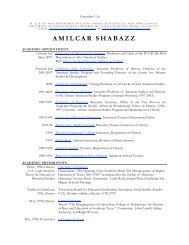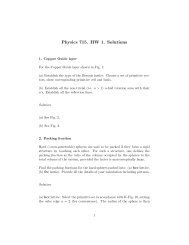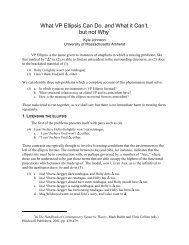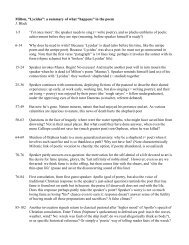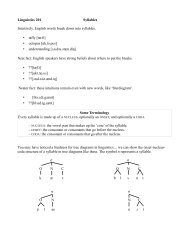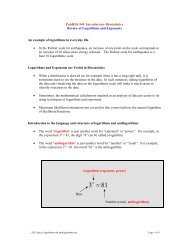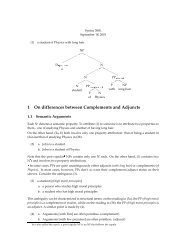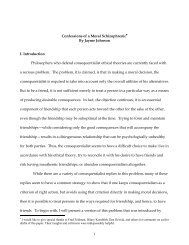Protagoras (PDF)
Protagoras (PDF)
Protagoras (PDF)
You also want an ePaper? Increase the reach of your titles
YUMPU automatically turns print PDFs into web optimized ePapers that Google loves.
10 PRoTAGoIs I 316b—317c 11<br />
22 So when we were inside and had spent a little more<br />
aeschrus.<br />
b time looking at everything, we went up to <strong>Protagoras</strong>, and<br />
I said, “<strong>Protagoras</strong>, Hippocrates here and I have come to<br />
see you.”<br />
“Do you want to talk with me alone or with others present?”<br />
he said.<br />
“It doesn’t make any difference to us,” I said. “Listen to what<br />
we’ve come for, and decide for yourself.”<br />
“Well, then, what have you come for?” he asked.<br />
“Hippocrates is from here, a son of Apollodoros and a mem<br />
c ber of a great and well-to-do family. His own natural ability<br />
ranks him with the best of anyone his age. It’s my impression<br />
that he wants to be a man of respect in the city, and he thinks<br />
this is most likely to happen if he associates himself with you.<br />
So now you must decide. Should we talk about this alone or in<br />
the presence of others?”<br />
“Your discretion on my behalf is appropriate, Socrates. Cau<br />
tion is in order for a foreigner who goes into the great cities and<br />
tries to persuade the best of the young men in them to abandon<br />
d their associations with others, relatives and acquaintances,<br />
young and old alike, and to associate with him instead on the<br />
grounds that they will be improved by this association. Jealousy,<br />
hostility, and intrigue on a large scale are aroused by such ac<br />
tivity. Now, I maintain that the sophist art is an ancient one,<br />
but that the men who practiced it in ancient times, fearing the<br />
odium attached to it, disguised it, masking it sometimes as po<br />
24 did, or as mystery<br />
26 and, in our own time, Herodicus of Selymbria (orig<br />
entum<br />
inally of Megara), as great a sophist as any. Your own Agatho<br />
27 a great sophist, used music as a front, as did Pythocleides<br />
des,<br />
23 and Simonides<br />
etry, as Homer and Hesiod<br />
25 and<br />
religions and prophecy, witness Orpheus and Musaeus,<br />
e occasionally, I’ve noticed, even as athletics, as with Iccus of Tar<br />
22. Critias (c. 460-403), Athenian and cousin to Platos mother. Critias was an<br />
accomplished intellectual and writer of prose and poetry. Like Charmides, he<br />
was a leader in the oligarchic tyranny of 404 and was killed in the restoration of<br />
the democracy of 403. Critias has a major role in Plato’s Char,nides, and Plato<br />
named a dialogue after him.<br />
23. Hesiod was a didactic poet active in the eighth century B.C. His two princi<br />
pal works, Theogony and Works and Days, were fundamental texts in Greek<br />
education and culture. Herodotus says that Homer and Hesiod gave the Greeks<br />
their gods.<br />
24. Simomdes (c. 556—468 B.C.): a lyric and elegiac poet best known now for his<br />
epitaph on the Spartan dead at Thermopylae.<br />
25. Orpheus and Musaeus, two names associated with religious cults and prac<br />
tices at this period. Musaeus is considered to be wholly mythical. Orpheus,<br />
of Ceos, and many others. All of them, as I say, used these<br />
various arts as screens out of fear of ill will. And this is where I<br />
part company with them all, for I do not believe that they ac<br />
complished their end; I believe they failed, in fact, to conceal<br />
from the powerful men in the cities the true purpose of their<br />
disguises. The masses, needless to say, perceive nothing, but<br />
merely sing the tune their leaders announce. Now, for a runa<br />
way not to succeed in running away, but to be caught in the<br />
open, is sheer folly from the start and inevitably makes men<br />
even more hostile than they were before, for on top of every<br />
thing else they perceive him as a real rogue. So I have come<br />
down the completely opposite road. I admit that I am a sophist<br />
and that I educate men, and consider this admission be I to a<br />
better precaution than denial. And have given thought other<br />
I to<br />
precautions as well, so as to avoid, God willing, suffering any ill<br />
from admitting I am a sophist. I have been in the profession<br />
many years now, and I’m old enough to be the father of any of<br />
perhaps historical, perhaps only mythical, was the famed singer whose beloved<br />
wife Eurydice died from the bite of a snake. Orpheus went to the underworld<br />
and pleaded with its ruler to allow her to live again. He was granted his plea on<br />
the condition that as he left Hades he would not turn around to look at her. He<br />
was unable to keep his promise and thence lost her forever, to his despair.<br />
Another tradition was that Orpheus was torn limb from limb by Thracian<br />
women (maenads) in a Dionysiac frenzy; yet despite this, he still lived, his<br />
severed ragged head floating down the rivei singing forever sweetly.<br />
These stories contributed to a religious cult tradition involving a cluster of<br />
beliefs, among the most prominent of which were the following: the soul was<br />
valued over the body; the body was considered as the tomb or prison of the<br />
soul; the killing of animals for food was considered as an unclean practice; such<br />
killing was also proscribed due to belief in transmigration of souls, including the<br />
souls of animals; and undergoing rites of purification (including practices of<br />
intellectual discipline) was urged for the sake of securing the good opinion of<br />
the gods and a happy existence for the soul after the separation from the body<br />
at death. These beliefs were associated also with the gods Apollo and Dionysus,<br />
as well as with the sixth-century philosopher and mathematician Pythagoras.<br />
Plato is perhaps the first and most reliable source of information about the<br />
beliefs of these cults, and he refers (favorably) to some of their doctrines in two<br />
of his dialogues, Meno and Phaedo.<br />
26. Iccus, a sixth-century-B.C. athlete and trainer of athletes from southern Italy;<br />
Herodicus, also a famous athletic trainer, who was a physician as well.<br />
27. Agathocles and Pythocleides, prominent musicians and music teachers.<br />
317<br />
b<br />
C



